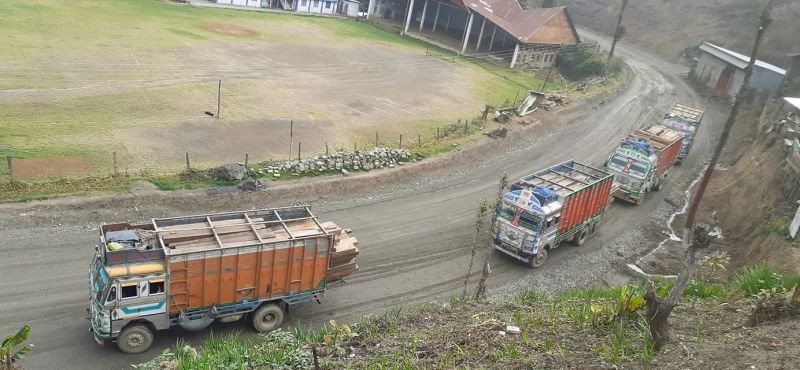‘This trucks have a long journey to make, after two days on road, this trucks have reached Pfutsero crossing 13 check gates, paying over 35,500 (per truck) as tax to UGs, Government Department, Civil Societies and still many more gates to pass, more tax to pay [Sic],' Rose Rekha Dukru shared on her Facebook page on April 4.

Vishü Rita Krocha
Kohima | April 5
Illegal taxation continues to hamper business in Nagaland even as a frustrated timber trader recounts her recent experience of spending at least Rs 40,000 to get past 16 check gates (most of them unofficial) from Thewati in Phek district to Kohima. Rekha Rose Dukru has been through the ordeal for several years now, negotiating with multiple Naga Political Groups, government departments and civil society organisations at every check gate and is used to being referred to as “mukh biya ase/conjuse ase/or this girl knows a bit of her rights,” precisely why she gets to keep her end of her bargain.
Even then, “imagine, I end up paying that much to various underground groups, government departments and civil society organisations. What about the majority of Timber transporters who are usually from remote villages, those who don’t have a voice? They cannot fight for themselves,” she poses. In timber business, you need at least one lakh rupees per truck as expenditure for transportation alone, she highlights.
From Zipu, the first check gate where the taxation starts, the loaded trucks have to cross 3 gates in Wazeho, 1 gate in Akhegwo, 2 gates in Meluri, 4 gates in Jessami (under Manipur state), 1 gate in Lanye, 2 gates in Pfütsero, and another 2 gates in Kohima. A few thousands here, another few thousands there—to NPGs, government departments including Forest, Police and Excise, Municipal and Town Councils and civil society organisations.
Passing through Jessami under Manipur state has also become another nightmare for timber traders like her. “For passing through their territory for a mere 10-15 minutes, we are paying Rs 4,000 to the Forest Department of Manipur, Rs 1,500 to the Manipur Police and Rs 1,000 to the Excise Department,” she states. “They are not even supposed to take. The forest product is of Nagaland, and not of Jessami,” she adds.
Timber business, she asserts, is such a tough job. “We live in the jungle for 2-3 months in the most interior parts, far away from family and loved ones. We work so hard only for all of our sweat and profits to be snatched away by these people,” she sighed in frustration. She also put across that sometimes, the frustration makes her want to give up. “It feels like one person against so many forces” when it comes to taxation, she says.
While the state keeps harping on entrepreneurship, and she acknowledges that it is not just in timber business but tax in every kind of enterprise, she also questions, “but who would like to do business when your own people are taking away so much from you?”
If Nagaland has to progress, she emphasises that the government also has to support and help the traders. In this regard, she urges the Forest Department to issue a nominal TP (Transit Permit) for timber sold within Nagaland while pointing out that, “that will really help in curbing taxation by other Government departments.” “The present system of issuing TP by Forest Department is too expensive, and a lot of traders cannot afford it,” she asserts.
Dukru further explains that the illegal taxation is not the only problem. “Another exploitation happens when you reach the market,” she underscores while putting across that the biggest players are in Dimapur—those who export, don’t pay tax, and they exploit in terms of measurement. “There are people who suffer loss in terms of lakhs. The villagers are the ultimate sufferers,” she goes on to explain.
Another timber trader, who did not wish to be named, lamented that the number of taxations seems to be highest in the Pochury area while listing a total of 5 Naga Political Groups to be paid in the area. “Paying these underground groups alone amounts to about Rs 20,000,” he states while expressing that “we are doing the business in the hope of getting a little profit to sustain our livelihood.”
“We are not saying, we won’t pay, but their demands are usually too much,” he says.






